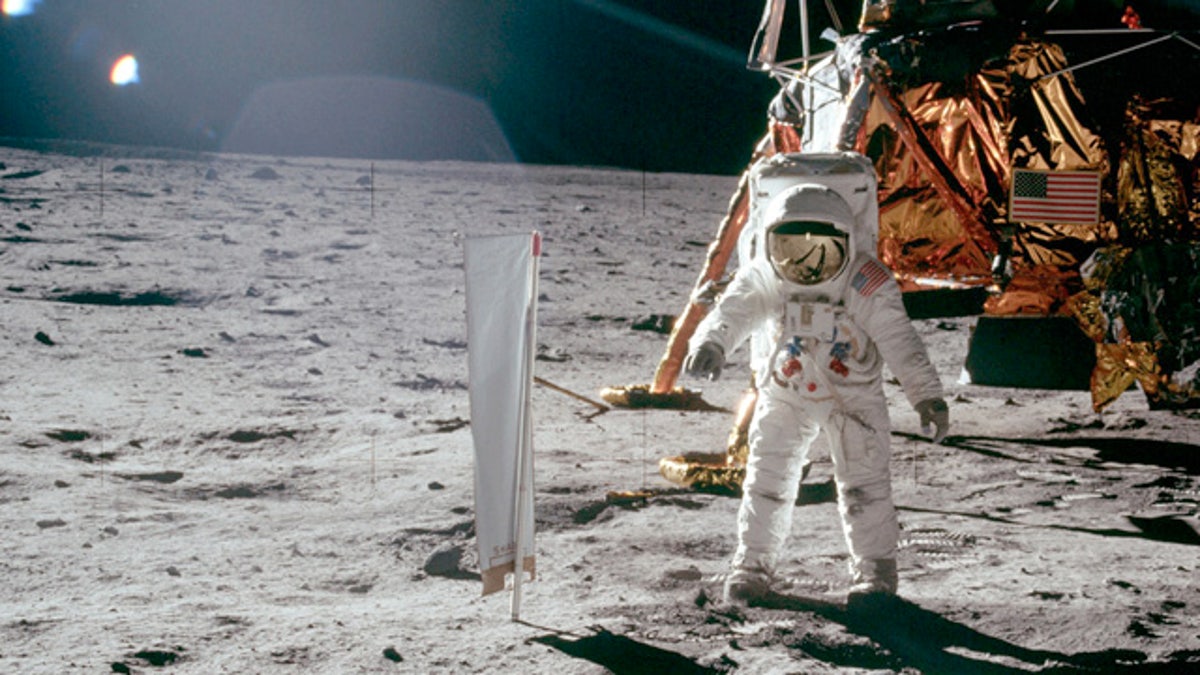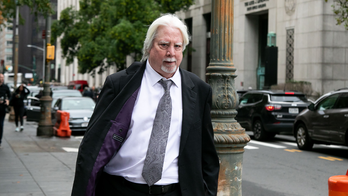
Buzz Aldrin stands on lunar surface in front Lunar Landing Module during Apollo 11's lunar mission. (AP)
Is a big government spending program with a commitment of money and resources on the scale of NASA's Apollo moon program, a way to rescue the U.S. economy?
Americans hearken back to Apollo as a period of national pride and resolve, and a willingness to spend freely in pursuit of a lofty goal. But if the Apollo program went down in history as one of the greatest achievements of mankind, the road to the moon landing holds lessons about the advantages and disadvantages of other long-term government spending programs.
When President John Kennedy announced in May of 1961 before a joint session of Congress his intention to land a man on the moon by the end of that decade, he may have been motivated by competition with the Soviet Union more than anything else.
He was determined to prove in the midst of the Space Race that the capitalist system was superior to the communist one. But ironically, Apollo required the kind of centralized planning and bureaucratic oversight that might conjure up a Soviet-style "Five-Year Plan” rather than the free market at work.
Its expense - $170 Billion in inflation-adjusted dollars – almost dissuaded Kennedy from launching the program. But he did not live to see the technological payoff from the project far beyond the 19 missions and seven lunar landings between 1966 and 1972.
Apollo was the origin of many technologies that found their way into the common household. Perhaps chief among them was the integrated circuit. Its development for the space program, led indirectly 20 years later to the proliferation of the home computer, and in part to the tech revolution, and led again to what scientists today call "Moore's Law, " which holds that the number of transistors on any one integrated circuit is being halved in size every two years. In other words, cell phones, computers, and all kinds of communications devices are getting progressively smaller, yet more powerful.
Economist Martin Bailey, the former chairman of the Council of Economic Advisors to former President Bill Clinton, now at the liberal Brookings Institution, sees Moore's Law as at potential genesis of the next technological revolution and economic boom.
"If you look back at that time, I don't think anyone predicted how strongly the effect of Moore's Law and the cheapness of computers and of telecommunications, what that was going to do,” Bailey told Fox News. “Since then we've had a lot of things like search engines, a lot of software stuff that has come along."
Today, government is now expanding broadband coverage, as it did with electrical power in rural America 75 years ago or the interstate highway system decades later. Those huge expenditures, undertaken at the behest of presidents Franklin Roosevelt and Dwight Eisenhower, respectively, put many Americans to work on the projects themselves and then allowed new economic opportunities once completed. But rapid change of technology means many jobs lost in the recession will never come back.
"How are we going to take the 40-year-old unemployed person who's been out of work for 12 or 18 months, give them skills that they need for a job that does exist?" asks Economist Brad Jenson of Georgetown University.
But some critics, including economist Veronique de Rugy of the conservative Mercatus Center at George Mason University, ay not all long-term government spending projects have produced such inspiring results as Apollo.
"I think we have to not lose sight of the fact that the government claims, that it's investing in our economy, and in our future, all the time. We're already spending gigantic amount of money on roads. We are spending gigantic amount of money on education, and it doesn't seem to be paying off at all."
Some experts see the benefit of a middle road - the public /private partnership. One of the pioneers of the internet, Robert Kahn once said that the Web would not have been possible without government funding. Indeed for all the inspiration and wherewithal of the private sector, money is often missing ingredient. By providing that, some economists believe, government can play a key role in helping to grow the economy.




